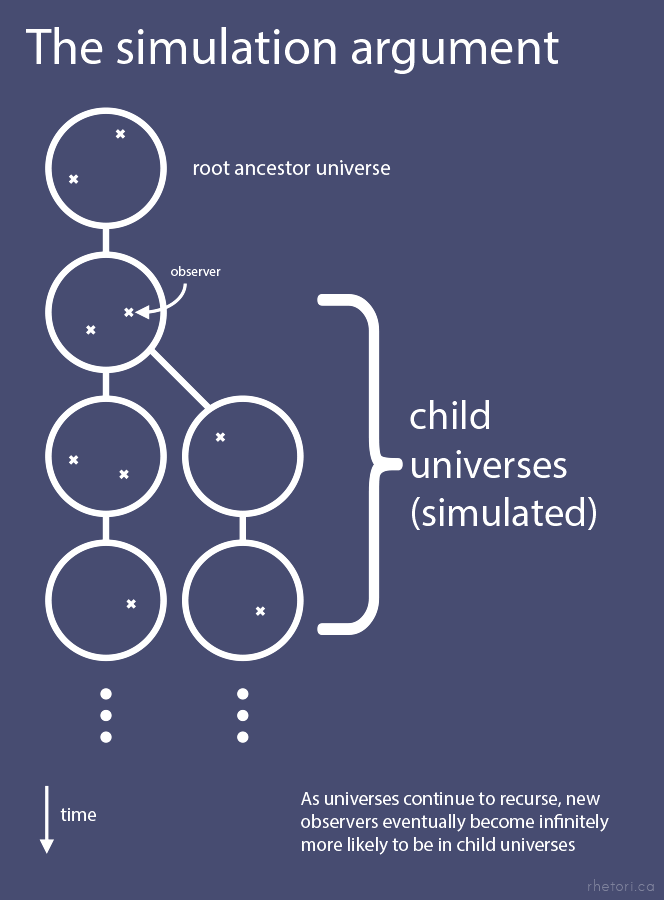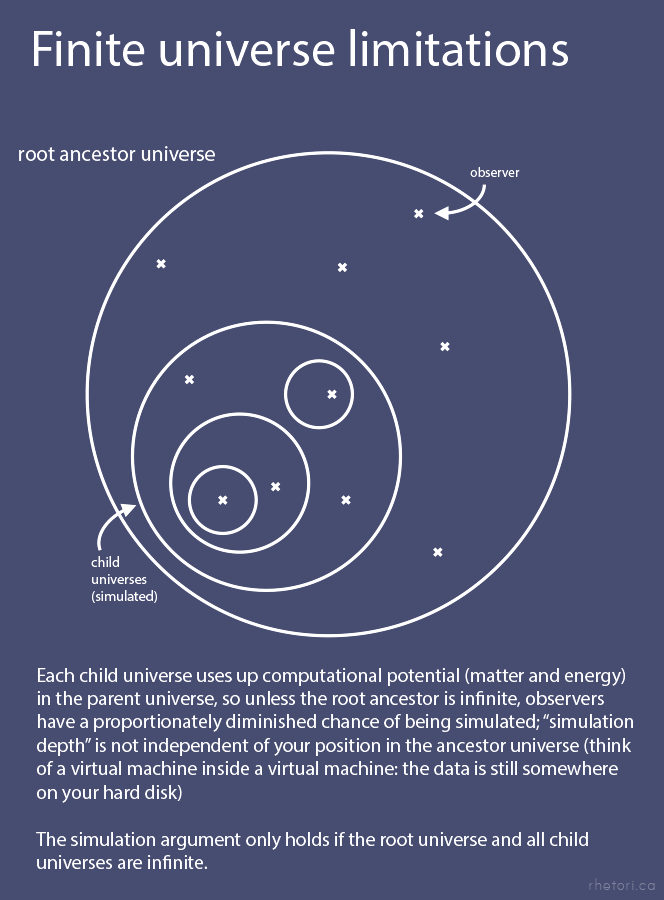Futurology has a few recurring ideas that are persistently popular. The most important of these is undoubtedly the technological singularity, the notion that it is inevitable that sufficient advances in intelligence will eventually create a process of infinite growth. This idea is not easily falsified: we don't know the nature of intelligence yet, so we can't make a coherent argument, in either direction, as to whether or not infinite intelligence (or effectively infinite intelligence) is possible.
Another topic explored by futurists in recent years is the question of whether or not we are living in a simulation. This notion has broad appeal, as, if it so happens that we are in a simulated universe, it would allow us to put to rest questions about the nature of the universe by making arguments from intent, and succinctly eliminate many lines of intellectual endeavour that seek to discover the purpose and origins of life and the universe as we know it.
In 2003, a philosopher by the name of Nick Bostrom introduced what he called the simulation argument, which has been widely discussed by both philosophers and the general public. Bostrom's reasoning bypasses metaphysics entirely, and treats all universes as equal:

As recursion proceeds and more universes invent their own simulations, the number of extant universes grows to infinity, and so an observer placed in one randomly is much more likely to be in a simulated universe rather than the unsimulated root.
However, as noted, this reasoning bypasses both metaphysics and physics by regarding only the observer's experience. If we take an empirical perspective and acknowledge that observers take resources—energy, matter, computation power, etc.—then we discover that every new child universe must also take up some amount of resources from the parent universe. In the extreme, an entire universe could be used for a giant computer that simulates as much as possible as efficiently as possible, but there would still be losses in efficiency to create the simulator. A perfectly efficient universe simulator that takes up a whole universe isn't a simulation—it's just a different configuration of the parent universe, and doesn't count.
Consider a hard drive that holds the image of the disk of a virtual machine. This disk image cannot exceed the size of the parent drive, and more importantly, the space consumed by its disk cannot be used for anything else, even though it may be compressed or interlaced with another file. The same is true of our simulated universes: resources used by the simulator cannot simultaneously serve another purpose.

As a result of this, we don't have any information on the probabilities of living within a simulation; that information is dependent on the rates of observer creation and destruction within each universe (simulated and otherwise), which are in turn dependent on the physics of those universes. Observers can be assumed to be randomly placed throughout a given universe if the logic behind the Drake equation is sound, i.e. that life has a random chance of emerging anywhere in a given universe. If this is not the case for a universe, then we have no information at all.
Bostrom acknowledges the possibility of an infinite root universe as an alternative, in which case he considers the probability of living in a simulation to be very low, as he does not consider the possibility of infinitely large child universes within an infinite root universe.
Another topic explored by futurists in recent years is the question of whether or not we are living in a simulation. This notion has broad appeal, as, if it so happens that we are in a simulated universe, it would allow us to put to rest questions about the nature of the universe by making arguments from intent, and succinctly eliminate many lines of intellectual endeavour that seek to discover the purpose and origins of life and the universe as we know it.
In 2003, a philosopher by the name of Nick Bostrom introduced what he called the simulation argument, which has been widely discussed by both philosophers and the general public. Bostrom's reasoning bypasses metaphysics entirely, and treats all universes as equal:

As recursion proceeds and more universes invent their own simulations, the number of extant universes grows to infinity, and so an observer placed in one randomly is much more likely to be in a simulated universe rather than the unsimulated root.
However, as noted, this reasoning bypasses both metaphysics and physics by regarding only the observer's experience. If we take an empirical perspective and acknowledge that observers take resources—energy, matter, computation power, etc.—then we discover that every new child universe must also take up some amount of resources from the parent universe. In the extreme, an entire universe could be used for a giant computer that simulates as much as possible as efficiently as possible, but there would still be losses in efficiency to create the simulator. A perfectly efficient universe simulator that takes up a whole universe isn't a simulation—it's just a different configuration of the parent universe, and doesn't count.
Consider a hard drive that holds the image of the disk of a virtual machine. This disk image cannot exceed the size of the parent drive, and more importantly, the space consumed by its disk cannot be used for anything else, even though it may be compressed or interlaced with another file. The same is true of our simulated universes: resources used by the simulator cannot simultaneously serve another purpose.

As a result of this, we don't have any information on the probabilities of living within a simulation; that information is dependent on the rates of observer creation and destruction within each universe (simulated and otherwise), which are in turn dependent on the physics of those universes. Observers can be assumed to be randomly placed throughout a given universe if the logic behind the Drake equation is sound, i.e. that life has a random chance of emerging anywhere in a given universe. If this is not the case for a universe, then we have no information at all.
Bostrom acknowledges the possibility of an infinite root universe as an alternative, in which case he considers the probability of living in a simulation to be very low, as he does not consider the possibility of infinitely large child universes within an infinite root universe.